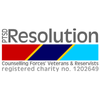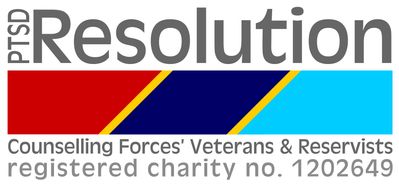UK Charity Delivers Mental Health Resilience Training in Ukraine
Published:
Read Time: 5 mins
As the conflict in Ukraine approaches its third year, the toll on the mental health of its population continues to escalate. In response to this growing crisis, PTSD Resolution, a UK-based charity renowned for its work with traumatised military veterans and their families, has expanded its reach to support those affected by the ongoing conflict.
In late 2023 the organisation designed a groundbreaking two-week resilience training program for delivery by a team with a diverse range of skills and experience in Kyiv, marking a significant step in addressing the mental health challenges faced by those in conflict zones. Due to the ever-changing nature of the conflict, the team assembled by the organisers, which included a representative from PTSD Resolution, worked with the Ukrainians to further develop the ideas.
The initiative came at the request of a contact of PTSD Resolution with both business connections to Ukraine and a UK military background, highlighting the diverse channels through which support is being sought and delivered in the war-torn country. This move represents a notable expansion of PTSD Resolution's scope, demonstrating the charity's adaptability and the universal relevance of its approach to trauma treatment, says Malcolm Hanson, Clinical Director of PTSD Resolution:
"Our time in Kyiv was profoundly humbling. We witnessed firsthand the inspiring work of local volunteers providing daily support to their communities. The resilience of the Ukrainian people in the face of such adversity is remarkable, but the need for mental health support is urgent and growing. Our experience in treating trauma among veterans has proven invaluable in this new context."
The scale of the mental health crisis in Ukraine is staggering, he says. According to the Ukrainian Health Ministry, the number of patients reporting mental health problems has doubled since 2023.
A study published in The Lancet paints an alarming picture, suggesting that 54% of Ukrainians, including refugees, are experiencing PTSD, with 21% suffering from severe anxiety and 18% from high levels of stress. These statistics underscore the critical need for interventions like the one provided by PTSD Resolution.
Human Givens Therapy
The charity's approach, rooted in Human Givens Therapy, focuses on brief, effective interventions. This method may prove particularly valuable in Ukraine, where resources are stretched thin and the need for support is vast. The training program developed for Ukraine emphasised several key aspects:
1. The importance of maintaining basic social interactions for mental health, even in the absence of clinical diagnoses.
2. The crucial role of attention in individual psychology and interpersonal relationships, particularly in high-stress environments like conflict zones.
3. The broader societal impact of conflict on mental health, highlighting the need for community-wide support systems.
4. The value of simple, adaptable "toolkits" for mental health support that can be used by individuals and volunteers without extensive clinical training.
5. The significant impact of volunteers and small acts of kindness in providing mental health support.
These principles align closely with the observations of mental health professionals working in Ukraine. As reported by the BBC, Anna Stativka, a Ukrainian psychotherapist, explains that the sudden loss of safety and stability - basic human needs - creates immense stress. "When these two basic resources are gone very suddenly, this creates a lot of stress," Stativka notes. "You can't stay in this hyper-alert state for so long," she adds, pointing out the long-term consequences on both mental and physical health.
WHO
The World Health Organization (WHO) estimates that the majority of Ukraine's population may be experiencing distress caused by war. WHO representative in Ukraine, Jarno Habicht, told the BBC, "It may have different symptoms. Some feel sadness, some feel anxiety, some have difficulties with sleep, some feel fatigue. Some are getting more angry. Some people have unexplained somatic syndromes, be it just pain or feeling bad."
Despite these challenges, Ukraine has made significant strides in addressing the crisis and battling the Soviet-era stigma associated with mental health. First Lady Olena Zelenska's "How are you?" campaign is a prime example of these efforts, bringing mental health discussions into the national spotlight.
The impact of PTSD Resolution's work extends beyond the immediate participants of the training program. By equipping local professionals and volunteers with effective tools and strategies, the charity is contributing to a ripple effect of support throughout Ukrainian society. This approach aligns with the observed trend of increased community cohesion in response to the trauma of war.
The charity's work in Ukraine also opens up possibilities for similar interventions in other conflict-affected regions. As the global community grapples with multiple ongoing conflicts, the lessons learned and approaches developed in Ukraine could prove invaluable in addressing trauma and mental health challenges worldwide.
The Ukraine Challenge
However, challenges remain. The sheer scale of the need in Ukraine dwarfs the resources currently available. The sustainability of such interventions, especially in a protracted conflict, is a concern. Moreover, reaching those in occupied territories or active conflict zones presents significant logistical and safety challenges.
The work of PTSD Resolution in Ukraine serves as a powerful reminder of the often-overlooked mental health consequences of conflict, says Malcolm Hanson. As Ukraine continues its fight for sovereignty, addressing these issues alongside more visible forms of aid is crucial. The battle for mental well-being remains a vital front in ensuring a resilient and healthy society emerges from the ashes of war, with PTSD Resolution's initiative providing both immediate support and laying the groundwork for long-term mental health infrastructure in Ukraine.
Contact: www.PTSDresolution.org
Ends
Editors notes
PTSD Resolution: Free, Prompt, Confidential and Effective treatment for Military Post-Traumatic Stress
PTSD Resolution, Charity No. 1133188, provides therapy for the mental welfare of Forces’ Veterans, Reservists and their families. Treatment is free, effective and delivered promptly and locally through a network of 200 therapists nationwide, and also by phone and internet. The charity can also work with organisations to help the mental welfare of their non-veteran staff, by arrangement.
Founded in 2009, the charity is accredited by the Royal College of Psychiatrists to the Quality Network for Veterans Mental Health Services (QNVMHS). It has had over 3,500 referrals to date, and delivers therapy in an average of seven sessions, with major number of cases seeing an improvement to where the client and therapist agree that no further therapy is required.
The charity is one of the only organisations to provide therapy to veterans suffering with addiction issues or who are in prison - as well as to family members, including partners and children, who may experience the symptoms of trauma from living with a traumatised veteran.
PTSD Resolution has a uniquely ‘lean’ operation, with no salaried staff or assets - funds are used to deliver therapy and for essential research and public information.
Contact www.PTSDresolution.org

